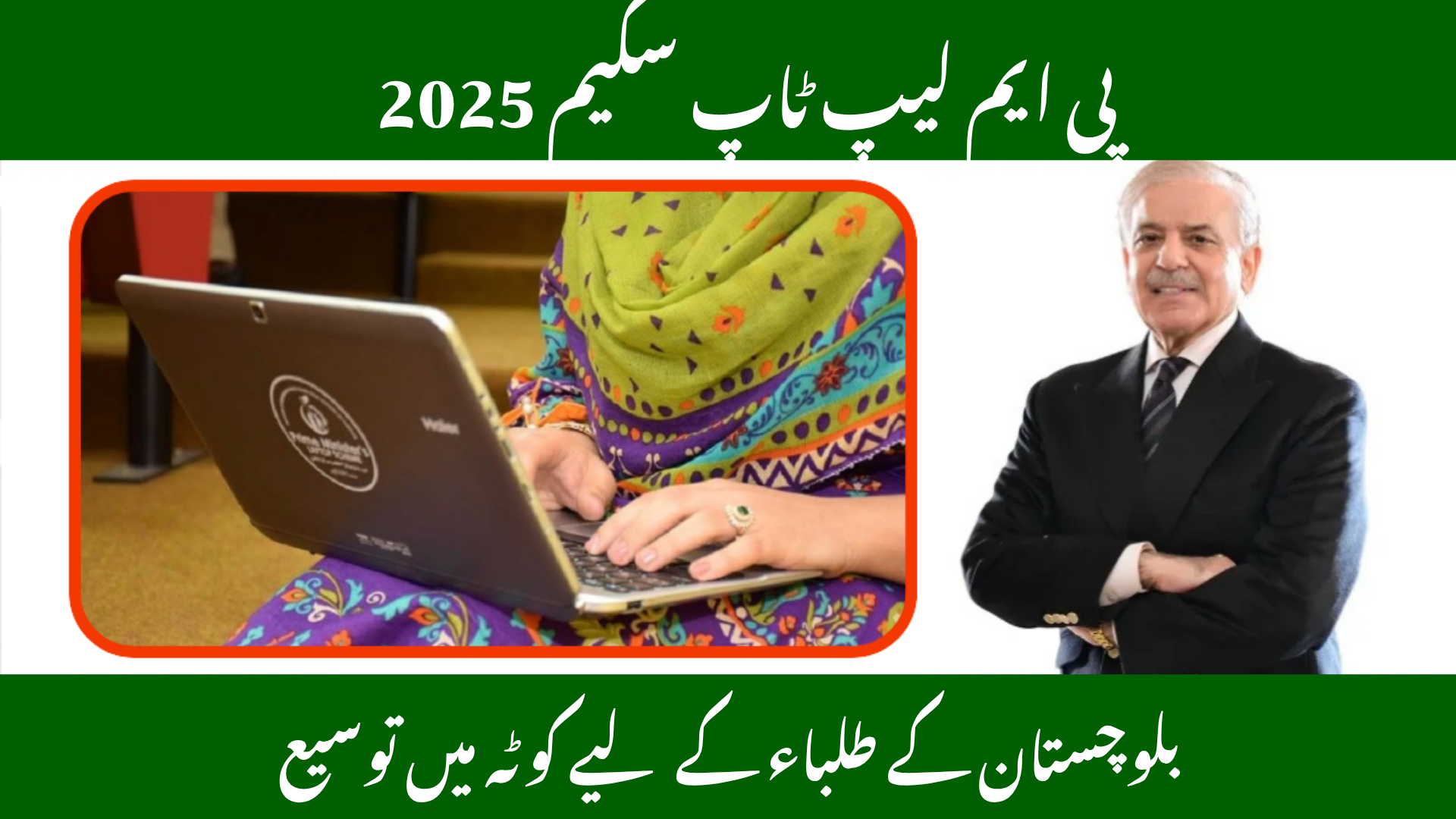PM Laptop Scheme 2025: Quota Expanded for Balochistan Students. In a major step toward promoting digital education and youth empowerment, the Government of Pakistan has announced an increase in the PM Laptop Scheme 2025 quota for students in Balochistan. This expansion aims to ensure equal access to technology, digital literacy, and modern education for all students across the country.
According to Rana Mashhood Ahmed Khan, Chairman of the Prime Minister’s Youth Program (PMYP), Prime Minister Shehbaz Sharif has raised the laptop allocation for Balochistan from 10,000 to 18,000 units — a significant move toward bridging Pakistan’s digital divide.
PM Laptop Scheme 2025 – Balochistan Quota Increased to 18,000
The announcement was made during the inauguration of Artificial Intelligence (AI) and Cybercrime training courses in Chagai, DHA Quetta. Rana Mashhood emphasized that this decision reflects the government’s continued dedication to technical education, skill development, and digital access for youth across all regions.
“Equipping young people with technology and innovation skills is essential for Pakistan’s future. The PM Youth Program is expanding its reach to ensure no province is left behind,”
— Rana Mashhood Ahmed Khan, Chairman PMYP
This new phase of the Prime Minister’s Youth Laptop Scheme 2025 supports students who are passionate about innovation, freelancing, and digital entrepreneurship.
Focus on Digital Skills and Modern Education
The PM Youth Program (PMYP) is not limited to distributing laptops — it represents a comprehensive national effort to transform Pakistan into a digitally empowered knowledge economy.
Under this initiative, students will gain access to:
- AI and Cybersecurity training courses
- Freelancing and digital entrepreneurship programs
- Software development and innovation bootcamps
These initiatives aim to bridge the digital gap between urban and rural areas and prepare Pakistani youth for the Fourth Industrial Revolution (4IR) — where technology, AI, and automation drive global progress.
Empowering Youth Through Agriculture and Startups
Beyond digital education, the PM Youth Program is also helping young individuals turn their ideas into agricultural startups and tech ventures. Many youth from Balochistan have already received financial support and business loans to launch agri-tech and entrepreneurial projects.
Rana Mashhood added,
“We’re building a new generation of innovators — turning job seekers into job creators.”
This reflects the government’s strategy to boost rural development, entrepreneurship, and self-employment while supporting sustainable economic growth.
Artificial Intelligence Policy and Future Vision
The Government of Pakistan has introduced a National Artificial Intelligence Policy, making Pakistan one of the few developing nations to take an official step toward AI integration.
Key Objectives of the AI Policy:
- Promote AI education in schools, colleges, and universities
- Encourage research and innovation in emerging technologies
- Use AI for better governance, agriculture, and defense
- Support youth-led digital startups
The AI-focused courses launched in Balochistan aim to strengthen digital literacy and technological inclusivity, ensuring that no student is left behind in Pakistan’s digital transformation journey.
International Employment Opportunities for Pakistani Youth
In addition to education, the government is expanding international employment prospects for Pakistani youth through NewTech funds introduced by Prime Minister Shehbaz Sharif.
Rana Mashhood shared that the government is working to:
- Enhance overseas job placements in the Middle East, Europe, South Korea, Canada, and the USA.
- Double Pakistan’s foreign exchange earnings in the next three years by training skilled workers.
This vision aligns with Pakistan’s goal of building a technically advanced, globally competitive workforce capable of meeting international market demands.
Government’s Commitment to Youth Empowerment
The expansion of the PM Laptop Scheme quota for Balochistan is part of the government’s broader mission to ensure educational equity and technological empowerment nationwide.
The PM Youth Program is currently working on several projects, including:
- Laptop distribution
- Digital skills and freelancing training
- Startup incubation
- Agricultural innovation
- Youth loans and business support
These initiatives form part of a holistic approach to reduce poverty, promote education, and empower Pakistan’s youth — especially in underdeveloped areas like Balochistan, Gilgit-Baltistan, and South Punjab.
Key Highlights – PM Laptop Scheme November 2025
| Category | Details |
|---|---|
| Program Name | Prime Minister’s Youth Laptop Scheme 2025 |
| Announced By | Rana Mashhood Ahmed Khan |
| Approved By | Prime Minister Shehbaz Sharif |
| Updated Quota (Balochistan) | Increased from 10,000 to 18,000 laptops |
| Event | AI & Cybercrime Course Inauguration – Chagai, DHA Quetta |
| Key Focus Areas | Digital literacy, AI training, skill development |
| Future Goal | Expand youth employment opportunities locally & abroad |
How Students Benefit from the PM Laptop Scheme
The Prime Minister’s Youth Laptop Scheme 2025 offers much more than just free laptops. It acts as a gateway to knowledge, digital tools, and self-reliance.
Benefits for Students:
- Free modern laptops with licensed software and online access.
- Enrollment in AI, Cybersecurity, and Freelancing training.
- Access to government-supported startup funding.
- Eligibility for PM Youth Business and Skill Programs.
- Inclusion in global digital work platforms like Fiverr and Upwork.
These benefits help bridge the digital divide and empower students to explore freelancing, innovation, and self-employment opportunities globally.
Conclusion
The expansion of the PM Laptop Scheme in November 2025 highlights Pakistan’s firm commitment to digital transformation and youth empowerment. By increasing laptop allocations, introducing AI training, and promoting freelancing, the government is creating a future-ready generation capable of driving innovation and economic progress.
With 18,000 laptops now reserved for Balochistan students, this initiative ensures that no province is left behind in Pakistan’s digital future.
















